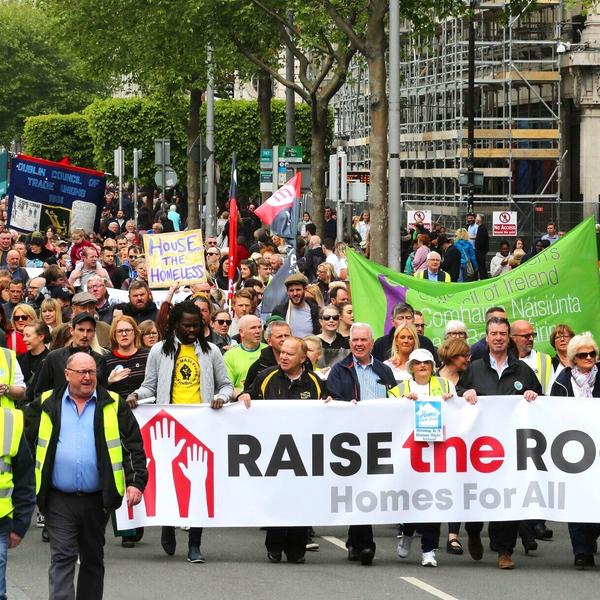
Art, Activism And The Housing Crisis
11 October 2024
We often say that building a people powered movement is the key to achieving our right to housing. And that’s correct. But I’d like to delve deeper into some of the barriers we encounter within housing activism and how we can overcome them.
Before I engaged in housing activism I experienced a lot of housing insecurity. I first became homeless when I was sixteen. When I left America two years later, I experienced more periods of homelessness in Europe. As an undocumented migrant I struggled to find housing and employment. My housing situation improved for a time in Ireland until the economic crash of 2008 resulted in the bank repossessing the flat we were renting. I’d been there for eight years paying rent to an absentee landlord. The flat was cold, damp, moldy, and infested with mice.
The bank issued us an eviction notice which we ignored. Despite the poor condition of the flat we decided to stay and squat. We had nowhere else to go. After an entire year of living with the fear of being thrown out, and after viewing countless flats with queues going the length of the street I finally succeeded in finding accommodation. But only because I lied about HAP. Although I was relieved to have secured a place to live my situation was still very insecure. In this property the landlord threatened to evict me if I didn’t make a routine council inspection ‘go away’. And once when I refused an illegal rental hike they actually accused me of ‘selfishness’.
But what I actually experienced throughout these ordeals was in stark contrast to the greed of the rich. It was the solidarity and incredible generosity of the poor that not only kept me alive but eventually led me to become a socialist. It was their help and solidarity that gave me confidence, and I believe it’s solidarity that empowers us all to resist, to fight for what’s right for both ourselves and our communities. We can’t succeed without solidarity. So I’d like to talk about what inspires everyday people to cultivate solidarity actions and what hinders them.
How do people overcome the sense of fear and shame they feel when they struggle with housing? I think, through sharing our stories, we can defeat that stigmatisation. Through interviews, articles, podcasts, through all forms of media, through meetings like this one. Through songs, art, film, theatre, and poetry (and I don’t mean that we do these things privately in venues, but publicly, on the streets, and that we use all the technology at our fingertips to record and promote them online). Our stories and feelings have power. Sharing them is revolutionary.
For instance, the government was absolutely rattled by the artist, Spicebag, and his visual depiction of modern day Garda at the scene of a 19th century eviction. Songwriter Martin Leahy’s anthem, ‘Everyone Should Have A Home’, has become a thorn in their side as more and more musicians like Christy Moore perform it, communities sing it, and the media writes about it, most notably by the Guardian newspaper. Songwriter Jimi Cullen’s anti-racist take on the housing crisis ‘Housing For All’ is another great example.
Nothing unmasks those in power quite like art. Because the government can’t debate a work of art like they can debate pundits or statistics. Art’s impact is because we feel it first and understand it later. Most people are aware of the horrors of the housing crisis but when it’s represented in a way that’s outside the box it resonates with people on a whole other level and frightens the establishment on a whole other level. Because no matter how hard the government tries to disguise who they are, the poor man’s truth is always greater than the rich man’s spin.
And the government is using all of its public relations machine in a desperate attempt not to appear like their former colonial masters. The terrible fact remains that rates of evictions and homelessness are now higher than at the time of the famine. The government is also aware that the people hold the power of a sleeping giant and they very much want that giant to stay asleep. The power of storytelling is about communicating history, learning from mistakes, celebrating victories, and empowering communities to resist. And Ireland has an astonishing tradition of tenant rebellion that we can draw from, enough to wake a sleeping giant.
But whenever we struggle on our own, the whole system is built to make you feel like it’s our fault. It’s designed to make us feel guilty and to isolate us from everyone else who’s experiencing the same thing. It’s designed to alienate us and debilitate us so we won’t join forces. Because they know all too well what our collective strength can achieve, what people power can achieve. This is why they crack down with disproportionate force on anyone who tries to occupy a vacant building. They will throw the full force of the state at you to prevent you from housing the homeless. I don’t think they’re concerned about a few vacant properties. What they’re really concerned about is the spark that lights a flame of housing activism. Of mass occupations, of protests, of overholding, of rent strikes, of resisting evictions.
Fighting landlords is an Irish tradition. Let’s look at some examples. (This is from the geographer Fiadh Tubridy):
“The late-19th century Land War, which involved mass nonpayment of rent by tenant farmers, led to the breaking up and redistribution of estates held by the Anglo-Irish ruling class and to the mass construction of labourers’ cottages throughout rural Ireland. As a result, by the beginning of the 20th century, Ireland had more public housing than anywhere else in the UK.
In the late 1960s, the Dublin Housing Action Committee and other groups around the country waged militant campaigns for better housing involving occupations, squatting and eviction resistance.
Just a few years later, between 1970-73, tens of thousands of council tenants across Ireland went on rent strike against increased rents, poor housing conditions, and a lack of services and facilities in council estates, amongst other issues. On May 11, 1971, the Cork Examiner reported the tenants’ commitment that “evictions would be met with physical resistance by selected action groups”. Attempts to evict rent-striking tenants were, in fact, successfully resisted in Kilmore West in Dublin and Newmarket on Fergus in Clare, amongst other areas.
These popular and well-organised movements forced successive governments to take steps to meet the country’s housing needs. Due to this pressure throughout the 1970s, the State delivered more public housing per year than our current Government, despite having significantly less resources than is the case today. Ireland’s history of mass organisation and collective direct action to secure improvements in housing and living conditions is directly relevant to today.”
And also we must not forget the incredible victory by the tenants of Leeside Apartments in Cork. It was a large apartment block of 75 households that all faced eviction when the vulture fund Lugus Capital purchased the building. They wanted everyone gone so they could then raise the rent by €1000 per month per apartment. Just 13 households in the apartment block decided to stay and fight. After a year and a half long struggle the vulture fund backed down and the entire building came under control of the Cluid Housing Association.
The entire block is now social housing. The remaining 13 households stayed and the other 62 apartments received social housing applicants. It was an astounding victory that demonstrated the power of solidarity. Hundreds of us turned out to support and march with them during their campaign. Their slogan was ‘Today Us, Tomorrow You’.
I don’t think it’s radical to demand housing as a human right. But every right that most take for granted now, was once the uncommon stance of radicals. The end of slavery, the end of child labour, women’s reproductive rights, the right to education, the right to vote, the eight-hour work day, the right to unionise. None of these rights seem radical today, but to win them, radical action was indeed necessary.
And the same is true for today. In the struggle for a better society we have to disrupt the status quo. Frederick Douglass famously said, “Power concedes nothing without a demand. It never did and it never will. Find out just what any people will quietly submit to, and you have found out the exact measure of injustice and wrong which will be imposed upon them, and these will continue till they are resisted with either words, or blows, or with both.” Essentially he’s saying you get the society you’re willing to fight for.
Should we quietly submit to the injustice of the housing crisis or should we loudly resist it? The establishment feels secure when they assume they have our compliance and if we stay silent they do indeed have it. But they get nervous when thousands of us take to the streets. When people lose their fear and take action together.
So to conclude I propose that our ability to win the right to housing is not just through mass direct action but also through our ability to successfully communicate stories of people and mass direct action, to empower and to inspire confidence in people’s abilities to organize and win, to wage class war against the state and landlords through art.
Your guitar is a weapon. Your paintbrush is a weapon. Your pen is a weapon. Your phone is a weapon. Technology that enables and amplifies your creative voice, your emotions, and your story, is a weapon. If anyone doubts the revolutionary potential of art and storytelling, just look at how despotic regimes and dictatorships silence artists and journalists that challenge them. Look at how efficiently those same tyrants co opt skillful communicators who harness art, media, and storytelling to protect the ruling class.
The housing crisis is the most important fight of our generation. Without housing every aspect of our life starts to unravel. Without it we struggle to find work, we can’t eat, we’re vulnerable to abuse, we’re constantly stressed, we can’t sleep, we fall into depression, sometimes people take their own lives. The housing crisis is a matter of life and death. And we live in a system where not only do the rich get richer and the poor get poorer but quite simply the rich get to live and the poor get to die.
There are several frontlines in this housing war. I touched on the emotional and psychological ones that rage inside our heads. The frontline that fights daily between hope and despair. But I became empowered when I started to fight back, I became empowered when I joined CATU, I became empowered when I joined my union, I became empowered when I joined Red Network. So I would encourage everyone to do the same. We should take confidence in knowing that it is the oppressor, not the oppressed, who should feel shame for running this system. It is the oppressor, not the oppressed, who should feel fear, because when our class unites in the struggle for equality, there is no limit to what we can achieve.
Isolated and alone we feel afraid, but together we can be fearless.
 RED NETWORK
RED NETWORK